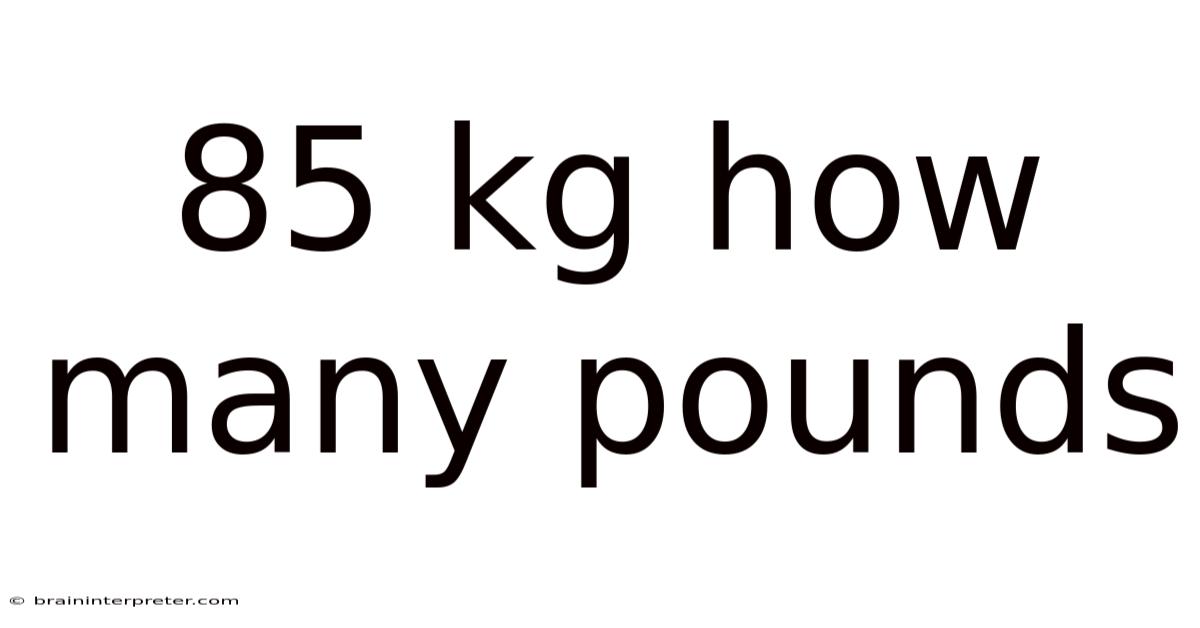85 Kg How Many Pounds
braininterpreter
Sep 21, 2025 · 4 min read

Table of Contents
85 kg How Many Pounds? Understanding Weight Conversions and Their Significance
Converting units of measurement is a fundamental skill across various fields, from everyday life to scientific research. Understanding how to convert kilograms (kg) to pounds (lbs), and vice-versa, is particularly useful in contexts like international trade, travel, healthcare, and even cooking. This article will thoroughly explain how to convert 85 kg to pounds, delve into the underlying principles of unit conversion, and explore the practical implications of such conversions in different areas. We'll also address common questions and misconceptions surrounding weight and measurement.
Understanding Kilograms and Pounds
Before diving into the conversion, it's crucial to understand the units themselves. A kilogram (kg) is the base unit of mass in the International System of Units (SI), often referred to as the metric system. It's a widely accepted standard across most of the world. A pound (lbs) is a unit of mass or weight in the imperial system, commonly used in the United States and a few other countries. While technically different (mass vs. weight), in everyday life, the terms are often used interchangeably, especially in scenarios where gravitational pull remains relatively constant.
Converting 85 kg to Pounds: The Calculation
The conversion factor between kilograms and pounds is approximately 2.20462. This means that one kilogram is equal to 2.20462 pounds. To convert 85 kg to pounds, we simply multiply:
85 kg * 2.20462 lbs/kg ≈ 187.39 lbs
Therefore, 85 kg is approximately equal to 187.39 pounds. You can round this to 187 pounds for general purposes, or maintain greater precision depending on the context.
Beyond the Calculation: Deeper Dive into Unit Conversions
The conversion we just performed is a simple example of a broader mathematical concept: dimensional analysis. This technique helps ensure the correctness of unit conversions by meticulously tracking the units involved. In our case:
(85 kg) * (2.20462 lbs/kg) = 187.39 lbs
Notice how the "kg" units cancel out, leaving us with the desired unit, "lbs". This approach is invaluable when dealing with more complex conversions involving multiple units.
Practical Applications of Weight Conversions
Understanding weight conversions holds significant practical value across various sectors:
-
International Trade and Shipping: Accurate weight conversion is crucial for determining shipping costs, customs duties, and complying with international trade regulations. Miscalculations can lead to significant financial losses or delays.
-
Healthcare: Weight is a critical parameter in healthcare. Converting weights between kg and lbs is essential for accurate diagnosis, medication dosage calculations, and monitoring patient progress. Inconsistencies in units can lead to medical errors.
-
Travel: Many countries use different weight units for baggage allowances on airlines. Knowing how to convert your luggage weight is crucial to avoid exceeding limits and incurring extra charges.
-
Cooking and Baking: International recipes often use different units of measurement. Accurate conversion is essential for achieving the desired results in cooking and baking.
-
Scientific Research: Researchers often need to convert units of measurement to ensure consistency and comparability of data across different studies.
-
Engineering and Construction: Accurate weight conversions are essential in structural engineering, load calculations, and material specifications.
Common Misconceptions and FAQs
-
Kilograms vs. Pounds - Mass vs. Weight: While often used interchangeably, kilogram is a unit of mass, while pound is often used as a unit of weight. Mass is the amount of matter in an object, while weight is the force of gravity acting on that mass. The difference becomes significant in situations with varying gravitational pull, such as on different planets. However, for everyday use on Earth, the distinction is often negligible.
-
Rounding Errors: When converting between units, rounding can introduce small errors. The level of precision required depends on the specific application. For most everyday purposes, rounding to one or two decimal places is sufficient. However, for scientific applications or situations requiring high accuracy, maintaining more significant figures is necessary.
-
Online Conversion Tools: Many online tools are available for quick conversions. While convenient, it’s crucial to understand the underlying principles to verify the accuracy of these tools and avoid reliance on potentially flawed applications.
Conclusion:
Converting 85 kg to pounds, which is approximately 187.39 lbs, involves a simple multiplication using the conversion factor of 2.20462. However, the significance of understanding weight conversions extends far beyond this simple calculation. Accurate conversions are critical in a wide range of applications, from international trade to healthcare and scientific research. By understanding the underlying principles of unit conversion and the potential consequences of errors, we can ensure accuracy and consistency across various contexts. Mastering this skill not only improves your problem-solving abilities but also enhances your understanding of the world around you. Remember to always consider the context and the level of precision required when performing any weight conversion.
Latest Posts
Latest Posts
-
Table Spoon To 1 4 Cup
Sep 21, 2025
-
Weight Of 1 L Water
Sep 21, 2025
-
60 Days From Oct 3
Sep 21, 2025
-
28 Days From 2 18
Sep 21, 2025
-
How Tall Is 51 In
Sep 21, 2025
Related Post
Thank you for visiting our website which covers about 85 Kg How Many Pounds . We hope the information provided has been useful to you. Feel free to contact us if you have any questions or need further assistance. See you next time and don't miss to bookmark.